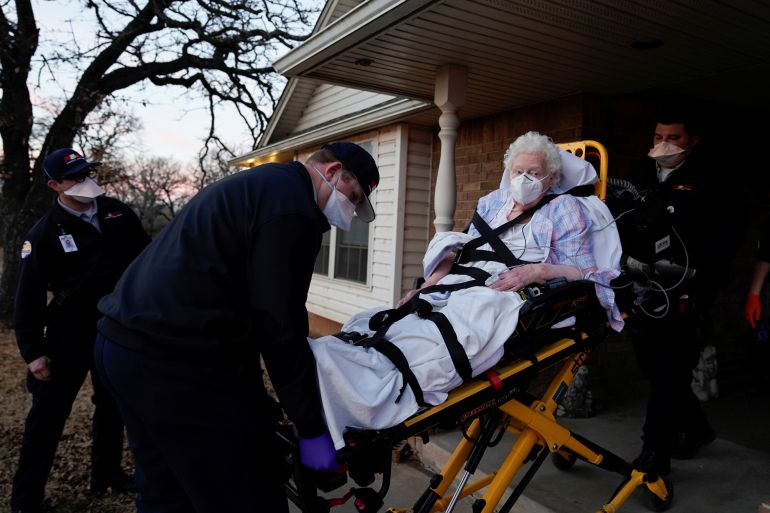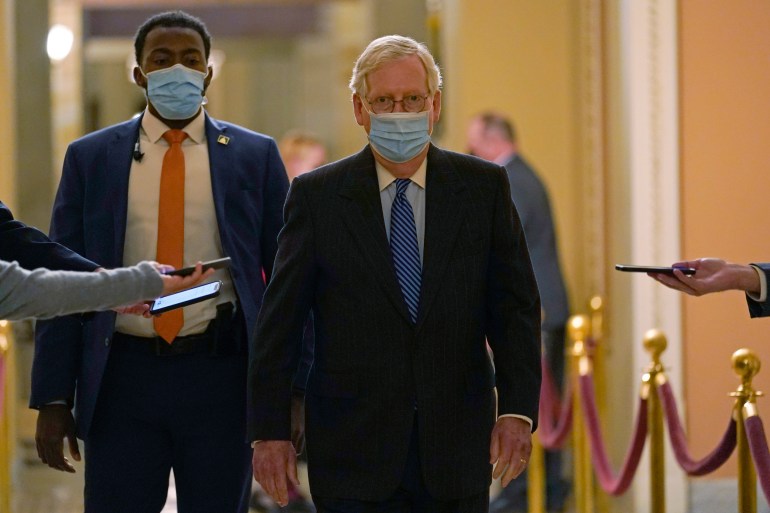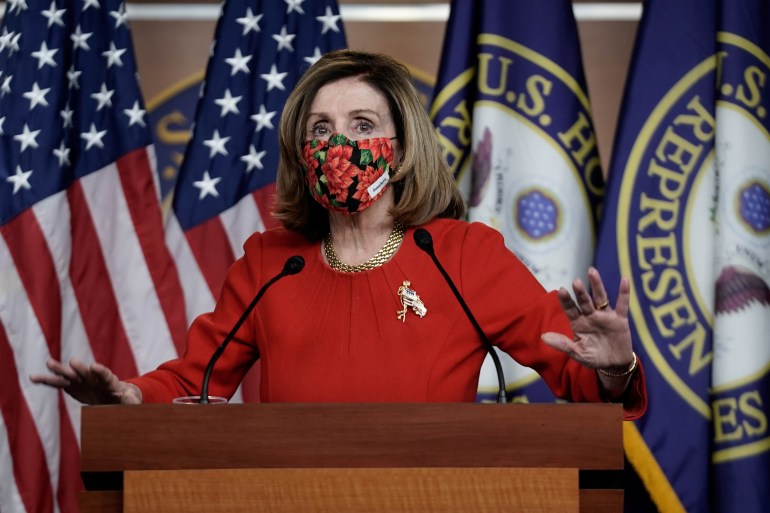US Congress seals deal to provide $900bn in COVID aid
Long-awaited deal would give $600 direct payments to individuals and boost unemployment payments by $300 a week.

After months of negotiations, legislators in the United States have agreed on a long-awaited COVID-19 relief bill that will boost unemployment payments and aid to small businesses.
The Senate’s top Republican and Democrat said on Sunday they had reached an agreement on a nearly $900bn package, a deal that would be the second-largest economic stimulus in US history, following a $2.3 trillion aid bill passed in March.
Keep reading
list of 3 itemsTrump downplays massive cyberattack on US government agencies
US Congress to work through weekend on $900bn COVID relief bill
“At long last, we have the bipartisan breakthrough the country has needed,” Republican Senate Majority Leader Mitch McConnell said on the Senate floor.
“More help is on the way,” he added.
The agreement would establish a temporary $300 per week supplemental jobless benefit and a $600 direct stimulus payment to most Americans, along with a new round of subsidies for hard-hit businesses and money for schools, healthcare providers and tenant facing eviction.
It comes as the pandemic accelerates, infecting more than 214,000 people in the country each day. More than 317,000 Americans have already died.

Republican and Democratic leaders said the package should have enough support to pass both chambers of Congress.
President Donald Trump supports the bill and will sign it into law, White House spokesman Ben Williamson said.
‘We have to do more’
Democrats acknowledged that the package was not as robust a relief package as they initially sought and promised to push for more aid after Democratic President-elect Joe Biden takes office on January 20.
“Anyone who thinks this bill is enough does not know what’s going on in America,” Democratic Senate leader Chuck Schumer said at a news conference.
“It is a first step,” said House Speaker Nancy Pelosi. “We have to do more.”
The Democratic-led House of Representatives will likely vote on the package on Monday, with the Republican-controlled Senate to follow, according to House Democratic leader Steny Hoyer.
Congress aims to include the coronavirus aid package in a $1.4 trillion spending bill funding government programmes through September 2021.
That funding was due to expire at midnight on Sunday (05:00 GMT on Monday). The House and the Senate voted to extend funding through to Monday, buying more time to pass the coronavirus package and the larger government spending bill. Trump signed the extension into law.
The relief bill had been held up by months of dysfunction, posturing and bad faith. But talks turned serious in recent days as legislators on both sides finally faced the deadline of acting before leaving Washington for Christmas.
The legislation leaves out two of the most contentious elements in the negotiations: legal protections for businesses from coronavirus lawsuits, which had been sought by Republicans and the substantial aid for state and local governments advocated by Democrats.
But the package helps state and local governments indirectly by providing billions for schools, coronavirus testing and other expenses, Schumer said. Details included $25bn in rental assistance, $15bn for theaters and other live venues, $82bn for local schools, colleges and universities and $10bn for child care.

The relief bill also includes elements unrelated to the pandemic: a bipartisan provision that aims to end surprise medical billing, and one that authorises flood control and other water-related projects.
The bill would allow Federal Reserve emergency lending programmes to expire on December 31 for businesses and state and local governments, which Republicans said were an unnecessary government interference in private business. But it does not prevent similar programmes from being created.
The pandemic will stand as the largest crisis facing Biden’s new administration, although signs of hope have emerged as the US has begun vaccinating people against the highly contagious respiratory disease.
In the 11 months since the first cases of the new coronavirus were documented in the US, COVID-19 has put millions of Americans out of work and unemployment has risen.
More than 10 million people who lost their jobs since the US outbreak began still remain out of work.
Economists say growth will likely remain sluggish until vaccines are widely available in mid-2021.